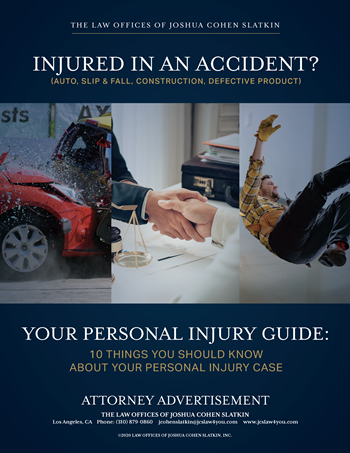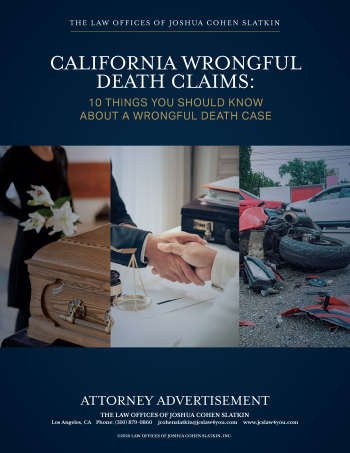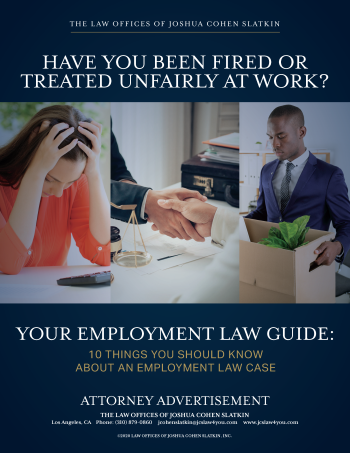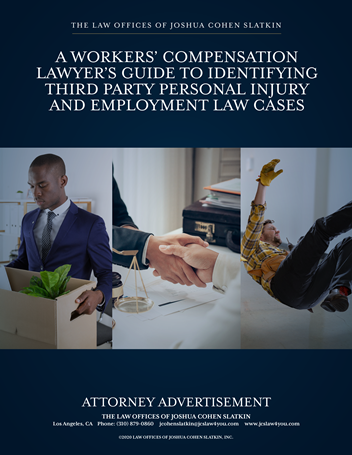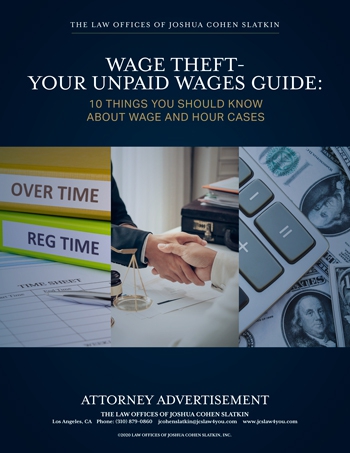If you believe you have been the victim of workplace discrimination in the Los Angeles area, JCS Law Firm can help you figure out your best options for recovering past and future wages and lost income, emotional distress damages, and even punitive damages in some circumstances to punish the employer. Punitive damages ensure that your employer does not continue to violate your rights and the rights of other employees.
Complete our contact form, or call us today, at (833) JCS-FIRM (527-3476) to schedule a free case evaluation and to explore the steps you need to take to hold your employer responsible for violations of California employment laws.
What Is Workplace Discrimination?
Discrimination can occur in a number of ways and affects each employee differently. Any form of discrimination is a violation of federal and state discrimination laws when the victims are members of a protected class. Most incidents fall into one of these categories:
- Disparate treatment: Perhaps the best-known type of discrimination, occurs when an employee suffers discrimination or retaliation based on his or her protected characteristics. An example is when an employer terminates an employee who had a physical or mental disability who needed workplace accommodations for their disabilities. Disparate treatment also occurs when the employer hires a less-qualified white candidate instead of a well-qualified minority candidate.
- Harassment: Harassment is one factor in the definition of a “hostile work environment.” Some examples that create this type of abusive environment include coworkers who use racial slurs, make unwanted sexual advances and/or sexual comments, or joke about a protected characteristic.
- Disparate impact: This refers to a situation where the employer puts a policy in place that targets a specific protected class. In most cases, this is not a situation with an individual victim, but one where all employees with the same protected characteristic suffer harm. For example, an employer may have a policy that all employees have to be a certain height, which may have a disparate impact on women who tend to be shorter than men on average.
To learn more about your right to be free from discrimination in the workplace, subscribe to our free newsletter.
Laws Which Protect Employees From Discrimination
The U.S. government has multiple laws in place to prevent workplace discrimination. These laws include:
- Age Discrimination in Employment Act (ADEA)
- Equal Pay Act of 1963 (EPA)
- Title VII of the Civil Rights Act of 1964
- Americans with Disabilities Act (ADA)
California has one main set of laws meant to prevent discrimination in the workplace, the Fair Employment and Housing Act (FEHA). This law is wide-reaching and offers additional protections above and beyond the federal laws. For this reason, most employees who file discrimination claims in Los Angeles base their claims on the FEHA.
Who Has Protection From Discrimination Under California Law (FEHA)?
FEHA offers protection against discrimination and harassment in several categories which include:
- Race
- Religion
- Color
- National Origin or Ancestry
- Physical or Mental Disability
- Medical Condition
- Marital Status
- Sex (Gender)
- Age (over 40)
- Sexual orientation
Who Is Responsible for Discrimination in the Workplace?
In most cases, the employer is responsible for discrimination in the workplace and it is our job to hold your employer accountable. This is especially true when the discriminatory acts are pervasive and a part of the company culture. If a supervisor discriminates against an employee who belongs to a protected class, the company can be held responsible under the doctrine of strict liability.
How Can I File a Discrimination Claim Against My Los Angeles Employer?
The first step in filing a discrimination claim in California is to file a complaint with the federal Equal Employment Opportunity Commission (EEOC) or the California Department of Fair Employment & Housing (DFEH). In most cases, California discrimination claims fall under the jurisdiction of the DFEH. It is very helpful to have an experienced lawyer assist you with filing your DFEH complaint.
Additional steps to take include:
- The EEOC gives employees 180 days from the date of the discriminatory action to file a charge. This is a short time window in which to act. However, you have three years to file a DFEH complaint based on FEHA from the date of the last discriminatory action which is often times the termination date. You then file the lawsuit within one year of the date when the DFEH issues what is called a ”right to sue” notice. Some discriminatory actions are “continuous” and can change the date of the last discriminatory action under the continuing violations doctrine.
- In California, you have two years from the date of your termination to file a wrongful termination cause of action not brought under the FEHA. This is known as a Tameny Claim. A Tameny Claim must prove that an employer discharged an employee for an unlawful purpose such as discrimination which is in violation of public policy.
- However, with a wrongful termination claim not brought under the FEHA, you are not entitled to attorneys’ fees and other benefits which are recoverable with wrongful termination claims under the FEHA. This is why you want to contact an experienced employment lawyer as soon as possible after you are terminated.
Because of the complicated, nuanced nature of employment laws, you will need a skilled lawyer from JCS Law Firm to help you bring this type of employment claim. Our team will walk you through this process and ensure you meet all necessary deadlines. Refer to our case results to learn how we’ve been able to help California workers just like you.
What Types of Damages Can I Recover From an Employment Discrimination Claim?
Employees who suffer discrimination in the workplace have the opportunity to recover a wide range of compensation which includes:
- Lost wages (This occurs when the employer terminates or passes an employee over for a promotion.)
- Future lost wages
- Past and future loss of benefits, including loss of health insurance and retirement plans
- Emotional distress, especially in hostile workplace/harassment claims
- Attorney’s fees
- Court costs
- Punitive damages in some circumstances
Common Defenses Employers Use to Defend Against Employment Claims
Of course, an employer accused of discrimination is going to deny it. Our attorneys have successfully argued against a number of defenses, including the following:
- After-acquired-evidence doctrine: An employer may claim that they only found out about employee wrongdoing—such as misrepresentation on a job application or on-the-job misconduct—after terminating him or her. The employer argues that they should not be liable for compensating the employee for damages since the employer would have terminated the employee had they known of the alleged misconduct.
- Failing to mitigate your damages: In order to avoid paying monetary damages, an employer may claim that the former employee has not actively sought comparable employment. That is why it is very important for your employment case to actively seek out substantially similar forms of employment, keep detailed records of your job search efforts (like a daily journal or log), and keep copies of all employment applications submitted.
- Legitimate, non-discriminatory reasons for termination: Even if you prove that discrimination was a “substantial motivating reason” for your termination, your employer may argue that they would have still terminated you for non-discriminatory reasons. If your former employer is successful in this argument, you may only get declaratory or injunctive relief along with attorneys’ fees. In such cases, employees may not be entitled to damages, back pay, or reinstatement to their former position. Therefore, it is vitally important to seek legal representation from an employment lawyer to overcome these common defenses.
How Can JCS Law Firm Help Me Win My Claim?
If you feel you have been the victim of discrimination in the workplace, you don’t have to suffer alone. California’s discrimination laws offer protection for a number of protected classes who regularly suffer from abuse in the workplace. You have the right to file for compensation for your losses without the risk of retaliation.
Request our free e-book, Your Employment Law Guide: 10 Things You Should Know About an Employment Law Case, to learn about your rights.
JCS Law Firm can help you exhaust the administrative remedies necessary to file a discrimination claim based on federal or state laws and navigate the claims process to get you the compensation you deserve.
Call us today at (833) JCS-FIRM (527-3476) or complete our contact form to schedule your free consultation.

